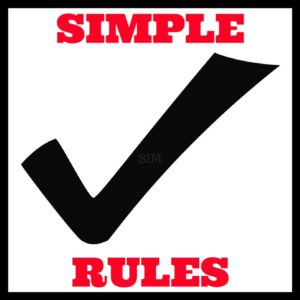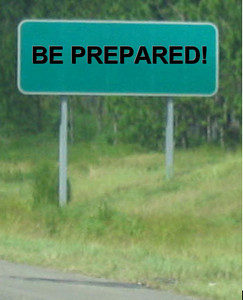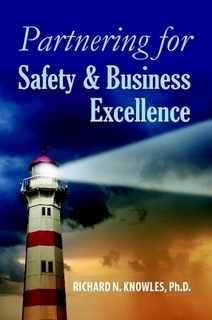Production activity in most businesses is going up with all the changes in our economy.When there is a change in activity like this, we move into a danger zone. People are busier. More people are needed so the hiring picks up. Already there are reports of more serious injuries and fatalities showing up.
In a time like this, management must take a strong lead so the safety efforts pick up and fewer people get injured or killed. Extra attention is needed.
Simple Rules – Part I
 One of the most effective things that I did in stressful and changing times like these was to follow these three rules:
One of the most effective things that I did in stressful and changing times like these was to follow these three rules:
- Share Information
- Build Relationships
- Show how each person’s work connects to the larger business
First, I spent more time in the plant talking with the people, sharing information about all our safety, environmental and business activities. People were eager to know about these things so we had many good conversations. I talked about the importance of our safety work, the need to keep our standards high, and to work together so that we could all go home in one piece. I reported on our environmental standards and reports to the State and EPA. People felt good when I could report progress in lowering our environmental impact. I also reported bad news, if that was the case. I talked about our businesses, our key customers, and the need to keep providing high quality products on time and at competitive prices. We talked about near misses and the importance of learning from them and not covering them up. I emphasized the importance of all of us sharing information and talking together.
Second, as I engaged with the people in the plant, I was respectful and attentive to their ideas and thoughts. I answered their questions, and if I couldn’t, I promised I’d get back to them with an answer, and I did. I modeled the respectful behavior that we needed. We talked about the importance of treating each other with respect and that harassment and bullying were not acceptable. Sometimes we did not agree, but I never bullied or put people down. When I found that I was wrong about something, I would admit it and apologize. This always opened up the conversations where we could have honest dialogue. We created a safe space for the important conversations. I encouraged everyone to talk with whoever they needed to talk with (regardless of organizational level or department) to get the information they needed for their work.
Third, I shared a lot of information about the importance of their particular job to our total success and asked for their help. We talked together and learned more about our respective contributions.
These three leadership processes are very powerful in helping the organization to come together and grow. But I could not do it all myself. I needed a lot of help from everyone so that we could pick up our production activities and do it safely without environmental incidents.
Simple Rules – Part II
 There are three important things that everyone needs to do to help to keep the safety performance and productivity high:
There are three important things that everyone needs to do to help to keep the safety performance and productivity high:
- Everyone needs to look out for themselves. Be sure you understand the work, have the right safety precautions in place, use the correct PPE, be sure to have the right people there to do the work safely, and being sure that lock-out/tag out procedures and other critical procedures are done. You need to get the rest you need to be sure that you are fit for the work and ask for help when it is needed.
- We all need to look out for each other, particularly when new people are coming into the workforce. The new people need to get up to speed and helping each other is critical. Help them to get oriented and learn how to use the PPE and other safety equipment. Teach them the right procedures. Keep an eye out for them to be sure they are fit for the work. If you see someone is getting into a problem, take the initiative and go to help them.
- Everyone needs to look out for this place where we are making our living. Keep things in order. Housekeeping needs to be excellent and the preventative maintenance needs gets done. The equipment inspections need to be up-to-date. Equipment should not be abused and damaged. Broken equipment should be repaired expediously and taken out of service if necessary. Work orders need to be addressed promptly.
We are all in this together. Managers and supervisors sharing information, building respect, trust and interdependence, and helping people to see the importance of their work for the success of the whole venture combined with everyone looking out for themselves, looking out for each other, and looking out for this place is a powerful way to keep the safety and production at levels of excellence even in a rapidly changing environment.
Simple Rules – Part III
 In your tool box meetings or shift start meetings, consider expanding your thinking to imagine how someone could get killed in work planned for the day. This is beyond what most groups do, but is an excellent way to prevent an unlikely tragedy. Talk together about how a fatality could happen. Even the most unlikely scenario will happen one day. Talk about what is in place that will prevent the fatality if the event should happen. Then ask yourselves if these preventative measures are good enough to really protect you. If not, then consider what you need to do so that you will be protected from being killed if the unlikely event should happen.
In your tool box meetings or shift start meetings, consider expanding your thinking to imagine how someone could get killed in work planned for the day. This is beyond what most groups do, but is an excellent way to prevent an unlikely tragedy. Talk together about how a fatality could happen. Even the most unlikely scenario will happen one day. Talk about what is in place that will prevent the fatality if the event should happen. Then ask yourselves if these preventative measures are good enough to really protect you. If not, then consider what you need to do so that you will be protected from being killed if the unlikely event should happen.
Many fatalities happen because some really unexpected event occurs. In hind-sight the problems are obvious. Let’s try to make them obvious before hand and prevent an unnecessary death.
Want more information? Or hold a conversation on this? Please give me a call at 716-622-6467. I am pleased to share how simple rules make a difference – a big difference.






Speak Your Mind